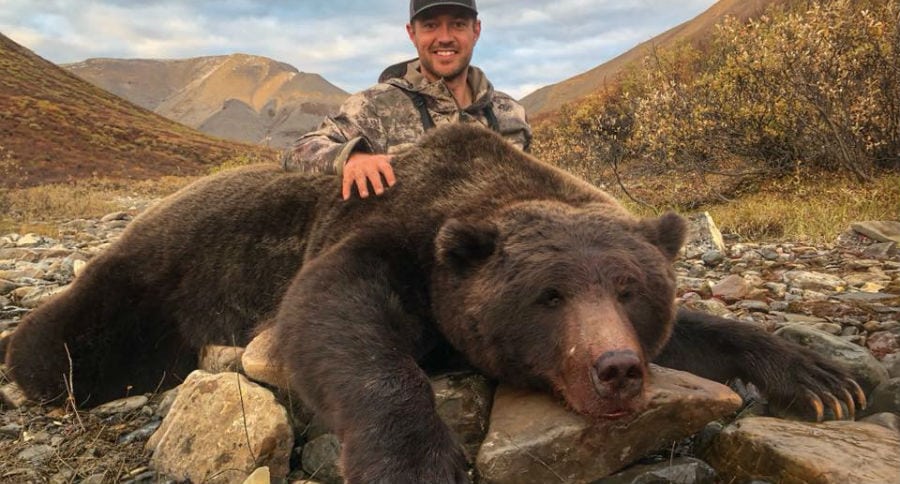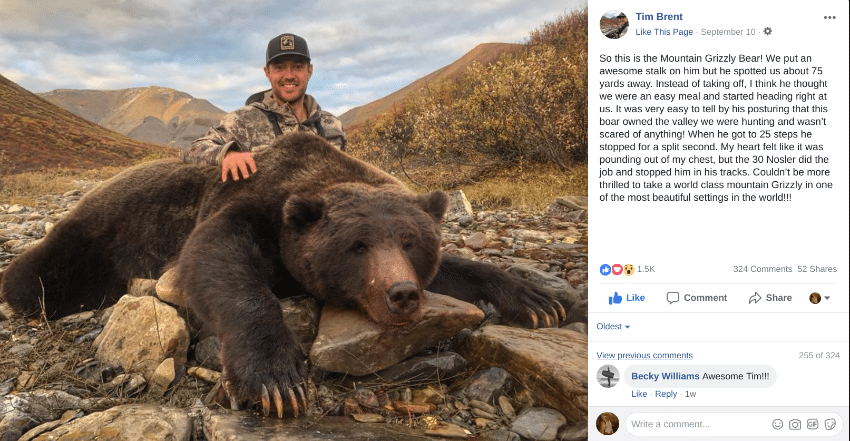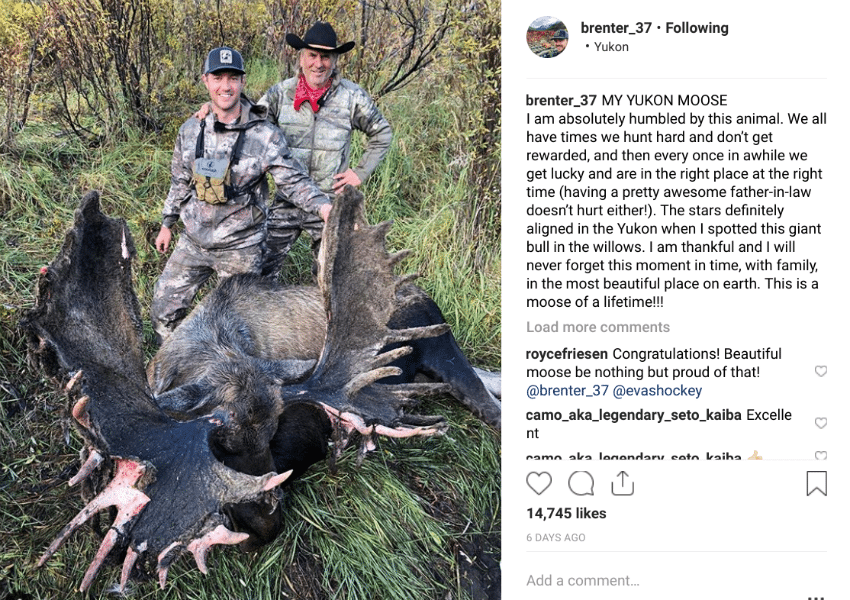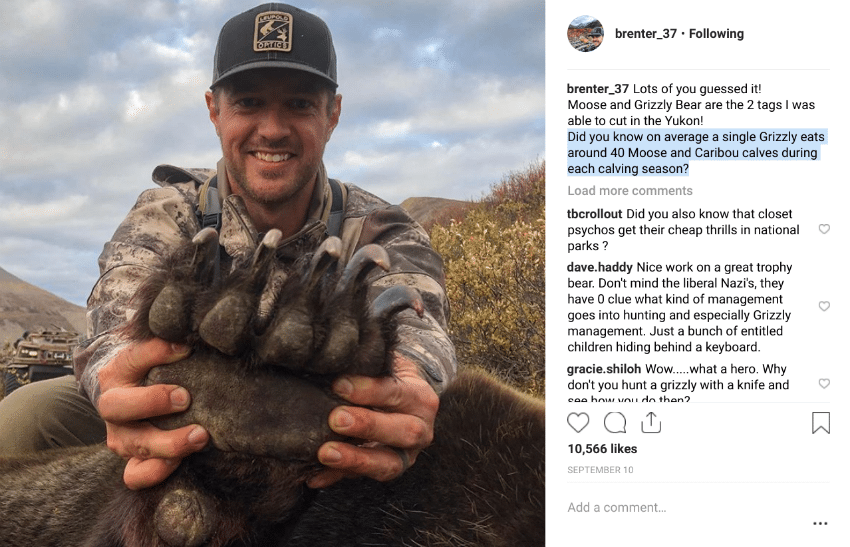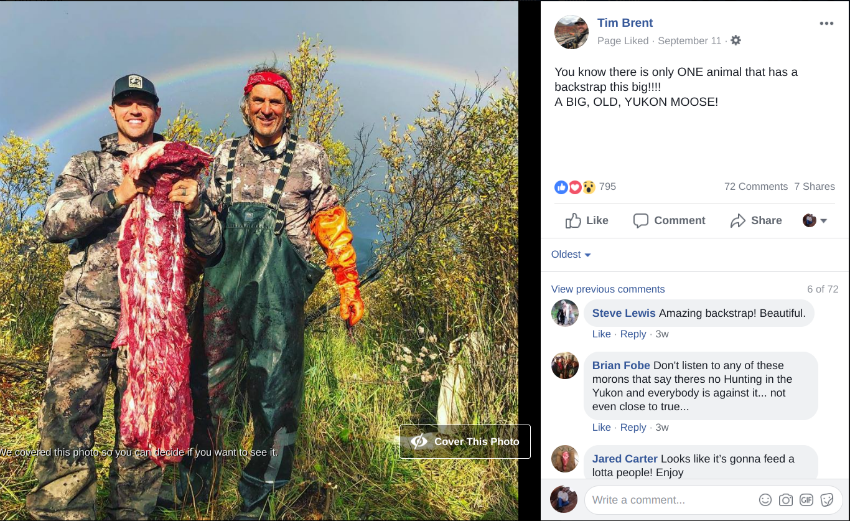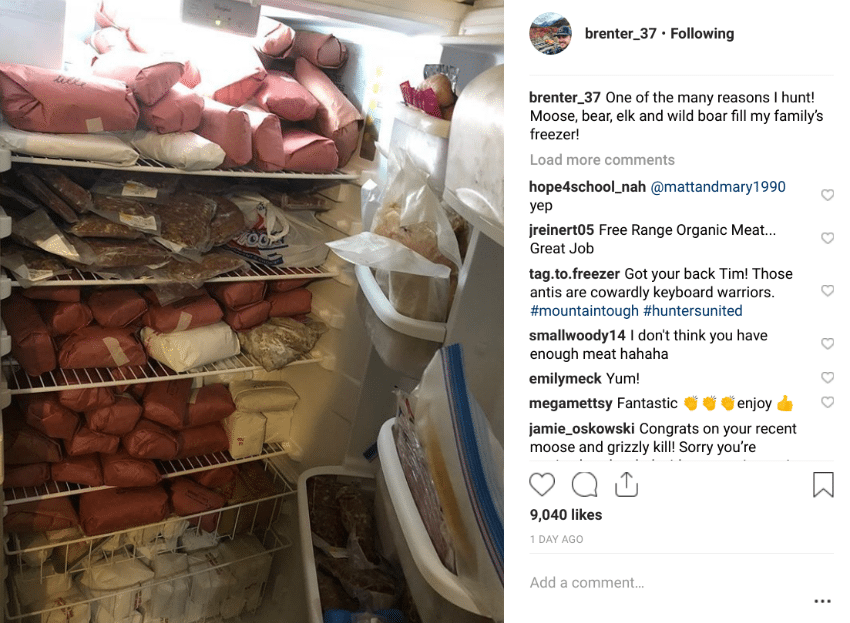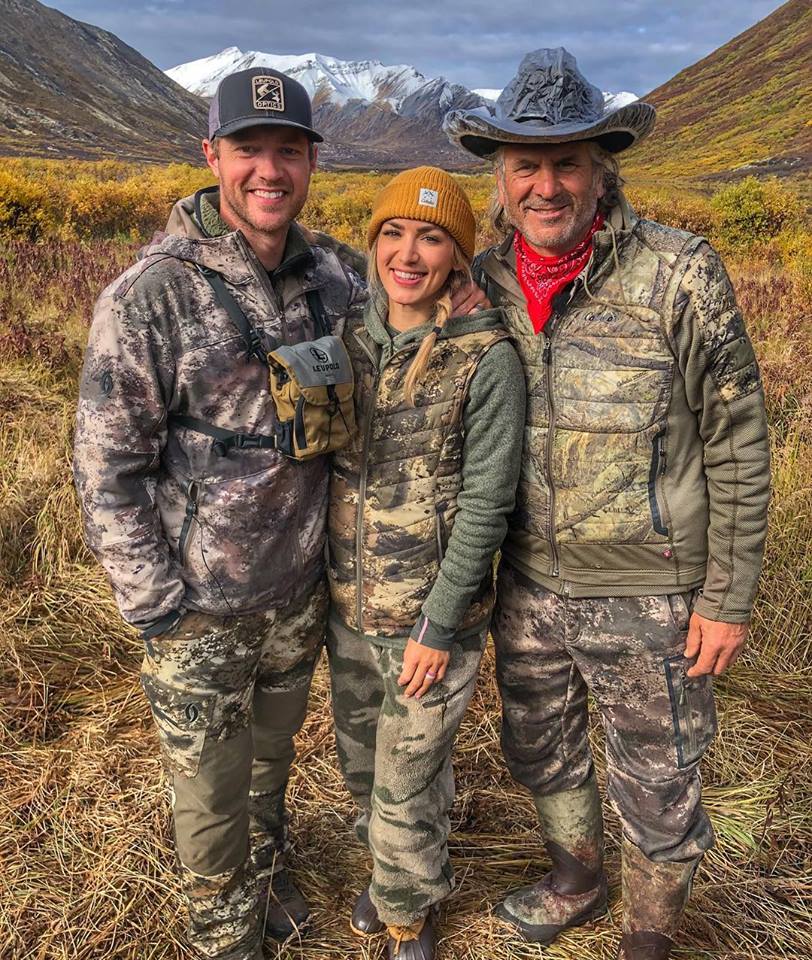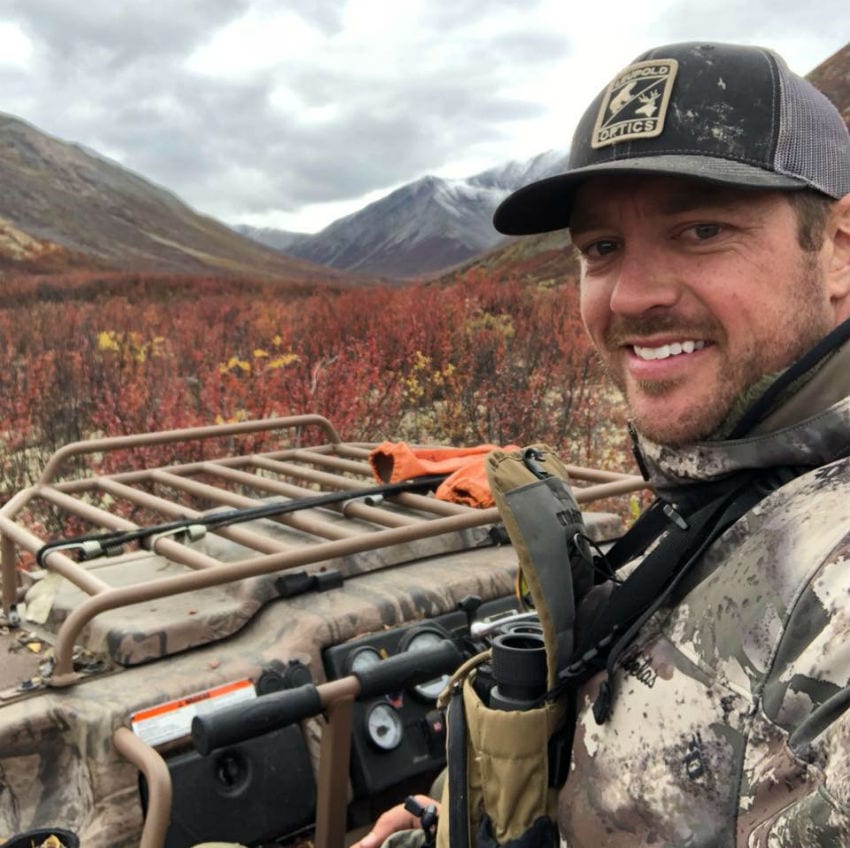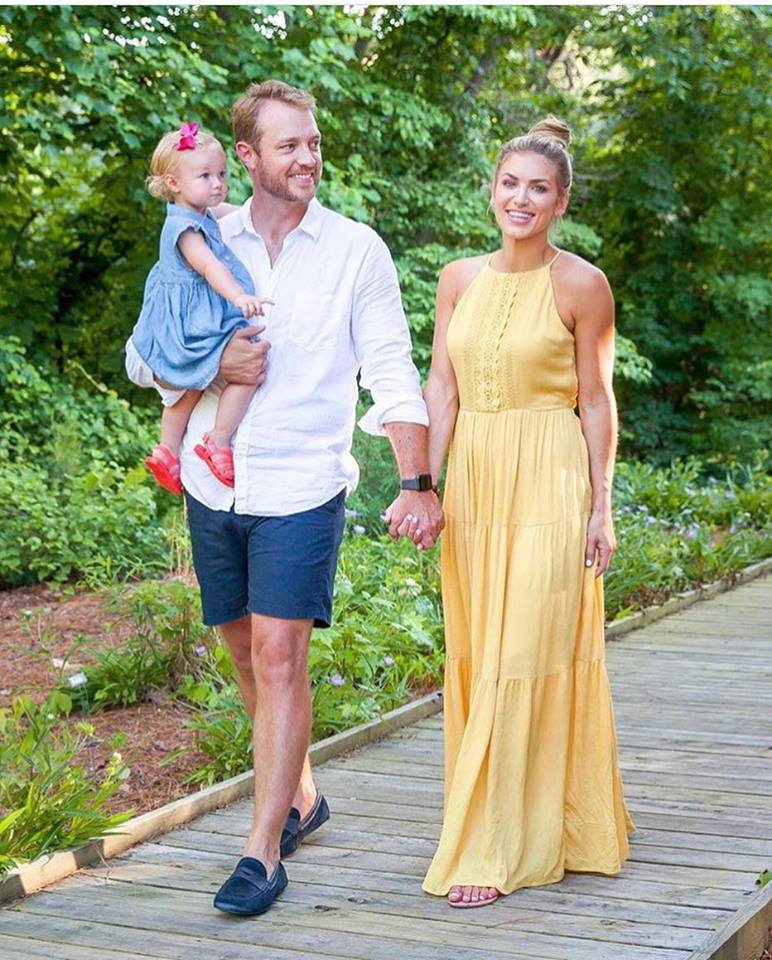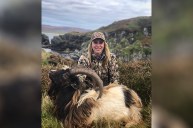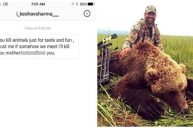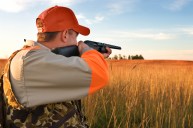Former professional hockey player Tim Brent responds to an avalanche of anti-hunting hate.
Last month we reported on former NHL player Tim Brent becoming the victim of an onslaught of social media hate after he shared a photo of a grizzly bear he killed. Now, Brent is responding to the anti-hunting vitriol, as well as the death threats his family received.
First, let's refresh your memory on the situation. Brent is a retired pro hockey player who played in over 200 games in the NHL, most notably with the Toronto Maple Leafs and Carolina Hurricanes. He's also the husband of renowned hunter and women's advocate for the outdoor lifestyle, Eva Shockey.
Since retiring from hockey, Brent has been able to spend more time pursuing his love of the great outdoors and the hunting lifestyle. Last September, he took a trip to the Yukon with his wife and father-in-law, Jim Shockey, to hunt moose and grizzly bear.
Brent had a successful hunt, harvesting both a big Canadian moose and a massive grizzly bear. He shared photos of himself with each animal on Facebook, Instagram and Twitter. Almost as soon as he posted the pictures, so-called animal rights activist and comedian Ricky Gervais saw the photo of the dead grizzly bear and made a snarky comment on his own Twitter feed. Gervais' comment effectively mobilized his army of dutiful followers to do the same.
Tim accompanied his photo with the text:
"So this is the Mountain Grizzly Bear! We put an awesome stalk on him but he spotted us about 75 yards away. Instead of taking off, I think he thought we were an easy meal and started heading right at us. It was very easy to tell by his posturing that this boar owned the valley we were hunting and wasn't scared of anything! When he got to 25 steps he stopped for a split second. My heart felt like it was pounding out of my chest, but the 30 Nosler did the job and stopped him in his tracks. Couldn't be more thrilled to take a world class mountain Grizzly in one of the most beautiful settings in the world!!!"
Brent was inundated with hateful, depraved and vile comments and even death threats directed not only at himself, but at his wife and two-year old daughter. While many people expressed support for Brent and congratulated him on a great bear hunt, the negative comments became so numerous that he couldn't keep up with them. He ultimately decided to tell his side of the story to Wide Open Spaces and other media outlets in order to combat the onslaught.
I spoke with Tim the other day while he was driving through the mountains. What struck me most about him was his humility and obvious kindness. The man spoke passionately and thoughtfully about the situation. And, despite the ugliness and violence coming from a great number of the anti-hunters, he hasn't attacked anyone. He simply wanted to get his story out.
The Interview
I began by asking Tim to say a little about his background in hunting.
Tim Brent: My parents don't even hunt. I started fishing as soon as I could walk. My dad loved to fish. I picked up hunting in my late teens with some friends of mine that were hunters. It was just kind of a natural progression for me. I loved to fish, and I picked up a bow and arrow and started bowhunting right away.
From hanging treestands and trying to figure out animals, to shooting my bow in the backyard to make sure I could make an ethical shot, to experiencing the rewards of eating wild game. Fast-forward, I obviously married into a family where the great outdoors is everything to them. It's not only their lifestyle, it's their job. So I've probably been put in a different position than I was before. As a hockey player, there was only so much hunting that I could do. We played through the majority of hunting season. So I didn't get to do as many of the hunts that I'm able to do now, and that I've always really wanted to do.
The main point I want to get across is that I understand that not everybody is going to be a hunter. I respect people that aren't hunters. That's a life choice that everybody gets to make on their own. But when it turns into yelling obscene names or, worst of all, death threats to my two-year old daughter and to my wife...it just crosses the line. I'm completely fine with people having questions or even not agreeing with hunting, but there was just a line that was crossed there.
I want to try to educate people that are spewing all of this hate. In my opinion, it's a lot of misinformed people.
David Smith: Do you think there's a difference between the misinformed or ignorant non-hunter and the hateful and violent anti-hunter?
Brent: Absolutely. There were certainly a lot of hateful messages and, like I say, the death threats are the obvious ones, and those kind of controlled what was being put on social media. And unfortunately, social media doesn't censor those things, they censor a picture of me holding a backstrap from a moose. You know, that's a whole other topic as to what and who is being offended by something that you could simply walk down the aisle of the grocery store and see the exact same thing. It's really just the fact that I was able to harvest my own meat.
Smith: Did you complain to Facebook? Did you file any sort of complaint?
Brent: Yes. There's a process. You can report a comment and they take it into consideration, and they will get back to you on whether they took action on it or not. Unfortunately, there were some death threats that I reported—it was Twitter actually—and they decided that it didn't fall outside of their guidelines, so they were going to leave those on Twitter. Instagram took the picture of the grizzly bear off of Instagram, claiming it was offensive to people, and censored a picture of me standing with my father-in-law (Jim Shockey) after a successful moose hunt, holding a 70-pound backstrap. It's just one of those things.
There are things on social media that offend me every single day, but those are considered freedom of speech or freedom of self-expression, so it makes you wonder who's controlling what's offensive and what isn't.
Smith: I've run into this over the years again and again, and it's always very interesting to me how these things happen. It's like once the negativity and hate get rolling, it's like a snowball rolling down a hill. It just keeps getting bigger and bigger, more and more. I don't know if they're just looking for some way to bolster themselves or what.
Brent: I think there's a lot of great things about social media, like being able to get certain messages out that maybe haven't had the opportunity to reach people. I think my wife, Eva, is a prime example. She's able to reach a lot of women and let them know that you can be a hunter and still be a lady, and there's nothing wrong with that at all. On the flip side of that, it also gives people a sense of security in being able to have a little more courage than they might have if they were face to face. To be able to call people names and utter death threats with no consequence. It's kind of a double-edged sword, but it's a big part of society now and it's something that we need to be aware of anyway.
Smith: Why don't you just delete these folks that are making these comments?
Brent: I tried to do that. But it kind of started with that guy Ricky Gervais, you know, he tweeted out to his followers that he's an anti-hunter and that I posted a picture of this grizzly bear...and you just can't keep up with it. It became a barrage of insults and threats. I think he's a comedian of some sort. He's based in the UK, and you go to bed at night and when you wake up there's a thousand more. So at some point you just go, "what's the point of wasting your time?"
The response was global. Gervais has millions of followers.
Whether it's my hockey background or what...I think that was a big reason it kind of became a headline. If I had been just a regular hunter, it may not have reached as many news outlets. Between my hockey background and my in-laws, it got out of hand.
Smith: Sure. You being a pro athlete as well as who you're married to. I think Eva is a ripe target for these people, because they don't like a woman doing what she does. Being independent and operating in what they probably see as traditionally a man's world, and maintaining her femininity.
Brent: Yeah, we understand that. And I think we feel the need at this point to stand up and say we're proud of what we do, we're proud to be hunters. We're going to stand up against the anti-hunters, the backlash and death threats and all the rest of it. And let them know that, first of all, we're not going anywhere. Hunting has been a tradition and heritage of this country and Canada—of North America—since the beginning of time. We want to try and continue that and pass it on for generations to come. We'll continue to protect our wildlife resources as outdoorsmen and women, so that we can have future generations of hunters and anglers.
The other thing that probably drove this for me more than anything, is that I've got a young daughter. You know, I can handle it when people call me names. And even if someone were to threaten me, I think I could shrug that off pretty easily. I've got pretty thick skin. That stuff doesn't necessarily bother me. But when you go and threaten my two-year old daughter, that crosses the line, and it really started making me think about the society that she's going to grow up in. And me taking a stance. In the not-too-distant future, she's going to be able to read this article that we're doing right now or see on a TV show, me or Eva standing up for what we believe in, and not letting someone who just screams the loudest make us second guess ourselves and what we do.
Whether she decides to be a hunter or not, she very well could be a vegan, right? Who knows. Those are going to be her decisions to make. But regardless, I hope she sees her parents as an example to stand up for what she believes in, and not let anybody push her around.
You want them to live their life. And like I said, I'm pretty easy-going. If you're a non-hunter, or a vegan or vegetarian, those are your choices. I'm okay with that. But at the same time, I'm going to make my choice to be a hunter and provide wild game for my family, and enjoy that wild game. And I don't think I need to listen to what anyone else has to say about it.
Smith: Or apologize for it.
Brent: Exactly.
I'm hopeful that a news outlet like yourself is going to be able to capture this—capture my feelings and stance on the issue. And I'm going to be able to, through social media, show this article and have people that both follow me as an athlete or as a hunter read it and understand why I am standing up, and why I do what I do and why our family lives an outdoors lifestyle.
You know hockey is a sport, and I loved every second of it. It was a huge part of my life from the time I could walk until just a couple years ago. But I truly believe that hunting and living life as an outdoorsman is truly a lifestyle. It's not a sport, it's a lifestyle, and we live that every day.
You and I both know that the pulling of a trigger or the releasing of an arrow is such a small, small, small part of the hunt, of the entire experience.
Smith: Are you hopeful that this kind of social media outpouring of hate is, I don't know, kind of a fad? Oftentimes these things seem to be somewhat cyclical in nature? People get hopped up on something for a while and then it tends to dissipate.
Brent: I'm hopeful that people like Jim, who has been a champion for the outdoors his entire life...he now has a platform where he can reach more people. Maybe not everyone watched his television shows, but social media feeds tend to spill over to people that maybe wouldn't be turning on Jim Shockey's Hunting Adventures. So I hope that we're able to reach more people that are maybe on the fence or don't understand it. Do I think that the true, hardcore anti-hunters will be impacted? You know, they don't even listen to anything that's written or put out by hunters.
You and I both know that the pulling of a trigger or the releasing of an arrow is such a small, small, small part of the hunt, of the entire experience. But they don't want to hear about anything other than that. So, to reach those hardcore anti's, I don't know if we'll ever do that. But I'm hopeful that we'll get the message of true outdoorsmen, true conservationists, out to people that are a little more open-minded.
But even more important, in my opinion, is getting that message out to the next generation of hunters and anglers. Again, Eva is doing a great job of speaking up for women in the outdoors, and the thought process that you can still be a lady and enjoy hunting and fishing and everything outside. To someone like Jim who has hunted everywhere in the world and knows all the ins and outs and nuances of hunting game animals that most of us can only dream of hunting. It's great to have people like that in positions with followings that hopefully will spill over into more outdoors-centered living.
Smith: Are you planning on going back up to the Yukon anytime soon?
Brent: I will go up there as soon as I can (laughs). It's the most beautiful place I've ever been to. I told Jim and Eva both that if I wasn't successful on my hunt in the Yukon at all, if I wasn't able to harvest a moose or a bear, it still would have been the best hunt of my life. That's the truth. It's an incredible place. You know, Rogue River Outfitters, which is Jim's hunting territory up there...if you can imagine, is the size of Maryland, it's 7 1/2 million acres. It's vast and absolutely beautiful.
The idea of waste and hunting...those are two things that do not go together.
Smith: I know the answer to this but tell us anyway. Did you harvest everything from the moose and bear? Predator meat is edible and delicious, is it not?
Brent: Yes, every little bit was taken out with us. Jim's got a natural history museum in BC, so we even took the bear's skeleton with us. Every bit of it. That bear is at the beetle farm right now being cleaned up and will go in the natural history museum.
The idea of waste and hunting...those are two things that do not go together. We as hunters have a connection to our food and meat and animals that surpasses anyone else's, in my opinion. I think that if people in general had the same connection as a hunter does to his food, we'd see a lot less waste here in North America.
Smith: I've always said that the most immersive experience in nature that you can have as a human being is to be a hunter. No other human activity brings you into the circle of life or closer to nature as does being a hunter. In everything else, you are an observer. In hunting, you're a participant in the predator-prey relationship.
Brent: You're right. And we've all, as hunters, probably had those conversations with people who ask why do you hunt, when you can go to the grocery store and buy your meat there? There's a disconnect. An animal still lost its life to provide meat to a grocery store. We just take part in the entire process. That process is something that you can't duplicate without being a hunter. And really it's something that keeps you coming back every season.
We love wild game. We eat wild game probably five or six times a week. There are very few people I've ever met that will turn down a venison jerky or pepperoni stick.
There's something, I think, innate in us as humans to want to be a part of that lifestyle, that predator-prey chain, like you said. Being outside, being in places like the Yukon, where very few...there were places that maybe no one ever stepped foot on or hadn't stepped foot on in thousands of years, that I got to explore. You see a mountain range off in the distance and I think we as outdoorsmen and women want to know what's on the other side of that. There's just so much more to being a hunter or an angler that gets kind of pushed aside because of a photo, a social media post that somebody doesn't like.
Smith: What do you think about the argument on sharing photos of our hunting experiences—that we might be better of not doing it?
Brent: I don't agree with it. We use it to memorialize an animal and the experience. That's the part that people may not understand. We're not putting out a photo to beat our chest and say "Oh look what we did." It was a moment captured in time in nature with a beautiful animal—a beautiful bear or moose—that will provide food for your family for months or even a year. You can look back at that photo and you can remember exactly where you were, who you were with, what happened, the entire process. That's what the photo's about. So, I'm not going to stop sharing that. A marathon runner goes and runs a race and takes a picture at the finish line, and he doesn't get abused for it. So why should I not take a picture if I'm successful on a hunt?
I also want to emphasize that we make sure that the animal is always shown in a good light. We took our time, we tried to clean any blood, we tried to show the animal respect by taking these photos. That's another thing that gets lost by the wayside.
Thank you for writing this. I think it's important for all of us hunters to know what we're going through as a group.
Endnote: What Tim Brent has had to go through is nothing new to many hunters. As hunters we've all had to deal with similar outrage from the keyboards of anti-hunters. Hats off to Tim for standing strong in the face of the lunatic fringe. These people know no shame and care not for civility or polite disagreement. Rather, they embrace rudeness and meanness, and express their ignorance with a sense of pride that is impossible to fathom.
Hunting is a noble and honorable lifestyle, something to which every human on the planet owes a debt of gratitude. If it weren't for hunters and hunting, human beings would not where they are now. And if it weren't for modern "sport" hunting ethics, many wildlife populations would be extinct.
Like what you see here? Experience more articles and photographs about the great outdoors at the Facebook page, Stumpjack Outdoors.
NEXT: RENOWNED CONSERVATIONIST SAYS TROPHY HUNTING HAS VALUE
WATCH
https://rumble.com/embed/u7gve.v3tq0x/
